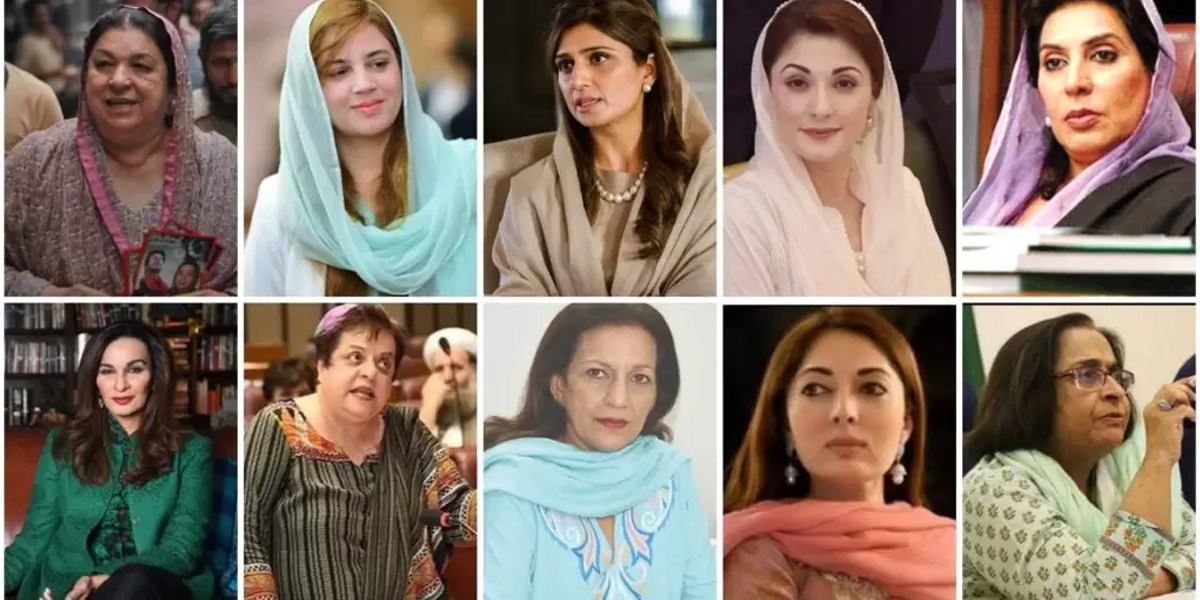According to the global gender gap report 2021 by World Economic Forum, the four major gaps in women empowerment tracked Political Empowerment as the first and most important gap. Across 156 countries around the world, women only represent 26.1 of the 35,500 parliament seats and just 22.6 of over 3,400 ministers. In 81 countries there has never been a woman head of state as of January 15, 2021. At the current rate, it would take 145.6 years to attain gender parity in politics. The gender gap in Economic Participation and Opportunity remains the second largest gap with Educational Attainment as third and Health and Survival as the fourth.

In Pakistani patriarchal society political participation of women has yet to be acknowledged as a “respectable” option due to the various prevailing stereotypes and assumptions regarding access to this option. Though the laws of the land and legislations have been ensuring the political rights of women, for instance a total of 10 seats was reserved for women in 1956 Constitution in the unicameral Parliament with five seats each from East and West Pakistan. The 1962 Constitution kept 6 seats for women in the National Assembly with three seats each from East and West Pakistan. The 1973 Constitution held in reserve 10 seats for women for a period of ten years from the commencing day of the Constitution or holding of the third general elections to the National Assembly, whichever occurred later. In 1985, ten (10) seats were increased to twenty (20), whereas the reserved seats for women were increased to sixty (60) in 2002 during Musharraf era. Various Constitutional provisions of 1973 constitution affirm the state’s determination to minimize gender disparity by the elimination of discrimination on the basis of gender and encouraging participation of women in all walks of life. Article 17 (2) of the Constitution provides every citizen with the right to form or be a member of a political party. Article 34 of the Constitution emphasizes full participation of women in national life and states that “Steps shall be taken to ensure full participation of women in all spheres of national life”. In order to implement the fundamental rights guaranteed in the constitution, substantive amendments in the constitution as well as election laws are made to ensure increased women’s participation in political process. For instance, 60 seats for women are reserved in the National Assembly under Article 51 and 17 seats are reserved in the Upper house under Article 59. While, 168 seats for the provincial assemblies. Sixty-nine (69) women out of 342 members are serving in the National Assembly of Pakistan. Of the total 69, sixty (60) women MNAs were elected on the reserved seats for women, and one (1) was elected on seats reserved for minorities, whereas eight (8) women MNAs were directly elected on general seats in the elections held in 2018. They include; Mehnaz Akber Aziz, Ghulam Bibi Bharwana, Zartaj Gul, Dr. Nafisa Shah, Shazia Marri, Dr. Fehmida Mirza, Shams un Nisa and Zubaida Jalal Khan.
Politics in Pakistan has been mostly a manly affair due to certain reasons. Particularly in current times where the political differences of opinion result in indiscriminate campaigns and trends on media and social media for every one. Presence in politics is all about policymaking, decision making and the main impediment is women being barred usually at every initial stage, when decision-making takes place in home. In the traditional Pakistani society, even in the smallest choice making, men sit and discuss while women sit and watch. The primarily prevalent mindset is that a woman’s actual place is home and since it is a male dominated society, when it comes to inclusion in politics, it is not usually considered respectable for a woman to be in politics. This is despite the fact that Pakistani political history has witnessed some very prominent names such as Baigum Rana Liaqat Ali Khan, Nasim Wali Khan and Benazir Bhutto (though their presence in politics can be attributed to the families they belonged to). Looking at the constitutional measures by successive regimes and constitutions, the Election Commission in 2018 made it mandatory for the political parties to give at least five percent party tickets to female candidates which was something positive.

Moreover, political participation of women is not simulated through economic empowerment. Women in reserved seats do not enjoy the status of a true representative as they reach the legislature just based on their performance as party worker and not by the power of vote. The sex segregation, socio-cultural values putting restrictions even on the mobility of women, status of being just a second graded individual are the core challenges. In addition, economic dependency, low rate of literacy are contributing factors as well.
The local government system can be of support as in last local government election 7000 plus females turned up in KP and fortunately many of them made it to the provincial Assembly of Khyber-Pakhtunkhwa like Aisha Bano, Asia Khattak, Dr. Sumaira Shams, and Dr. Asia. Encouraging political participation at educational stages, politically educating women on how to run the affairs are changes that need to be brought when it comes to attitudes and behaviors. Political Parties must have allocated tickets based on competencies and qualifications. Some of the parties like ANP don’t even have a female wing. A holistic approach will matter on part of state and civil society organizations in this regard as the female issues are much more than their attire, looks, and physical appearances.

